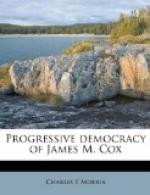Something else of character may be learned from the manner in which Governor Cox redeems pledges. When he was sorely beset by his political foes in 1914, it was represented to him that the liquor interests might be made to do service if licenses were withheld until after the election. And the answer given was something like this: “The pledge was given that the license system shall not be prostituted to partisanship. That pledge will be redeemed.”
The forebodings of the worldly wise were not disappointed. The liquor interests contributed heavily to the opposition candidate and supported him so well that he won the election.
Cox hates war even if he made a remarkable record as war Governor. But he likes the smoke and fury of political contest, and he thrives on campaigns. He has a fashion of leading his party organization and making it do his will, and like all men or this sort, he has been accused of being dictatorial. Yet none denies that he gives a fair hearing and is open to conviction on disputed issues.
He has a power of expression in a few words, portraying a whole field of action. Tending to go into great detail in public matters, he comes to the heart of an issue with a laconic expression that tells all there is to be told. “I favor going in”—on the League of Nations is one. Assuring his supporters that the proposal for separate peace with Germany was “opening their front lines,” he drew a word sketch of a gigantic contest in which he as a general had sensed a rift in the opposition ranks and had broken through a whole army.
Associates of Governor Cox say that he is daring because of his strong sense of justice. The question is frequently asked by him as to whether a proposition is fair to all sides. Readiness to trust in him as an arbitrator has brought many issues to his desk that are not part of a Governor’s official duties. Disputes between interests and differences among organizations, no less than capital and labor disagreements have been left to his decision. It is an evidence of the trust in the sense of justice in the man.
There is a notable habit in him of picking men quickly for tasks. It is not claimed for him that he has never made mistakes in his estimate of men, but they are comparatively rare.
Governor Cox is the only man ever nominated for President who owns wealth—real wealth. His personal fortune is handsome. That was a point of criticism when he began to get acquainted with the country, but it is no longer. The reason is to be found in the fact that he has a natural appeal that makes his associates forget money. Nor is the charge ever seriously made that his broad sympathy is affected. When he is best known, the wealth he owns is least often mentioned.
They do not refer to a wealthy man whose possessions are an outstanding attribute as “Jim” or “Jimmy.” Cox, the man of affairs, is overshadowed by “Jimmy Cox.”




